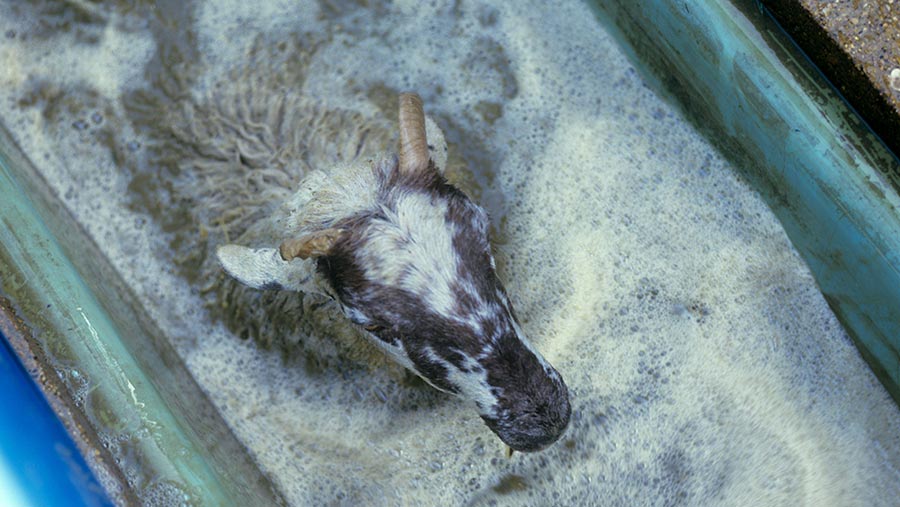10 questions to ask your mobile sheep dip contractor
 © Nigel Cattlin/Alamy Stock Photo
© Nigel Cattlin/Alamy Stock Photo Farmers are being urged to check that their contract sheep dipper is abreast of the latest regulations in an industry-wide effort to promote best practice.
As of this summer, the updated Mobile Sheep Dipping Code of Practice (PDF) requires dip to be prescribed to individual farms by individual contractors.
Jill Hewitt, chief executive of the National Association of Agricultural Contractors (NAAC), gives her advice on how to discuss your requirements with your contractor.
See also: New sheep dipping guidelines now in place – what to expect
1. Are they aware of, and complying with, the new code of practice?
The new code has been produced to remind farmers, contractors and prescribers of their responsibilities in the safe and effective prescription, storage, use and disposal of organophosphate (OP) sheep dip.
It also provides the contractor with a process to act as an intermediary between farmer and prescriber to legally access seven consecutive days’ supply of OP dip in advance.
It is essential to work as a team to minimise the risk of OP resistance developing in sheep scab mites; whilst safeguarding animal welfare, human health and the environment.
Areas covered by the code include: siting of the dip; best practice dipping procedures; sheep handling and welfare; and responsibilities following dipping.
2. Do they have the necessary insurance for sheep dipping?
Professional indemnity insurance is essential, and employers’ liability may be required.
3. Do they have an on-site operator with the NPTC Level 2 Award in Safe Use of Sheep Dip?
This qualification must be held must be held by the person dipping or supervising dipping, and they must be present throughout the dipping process. It is also required to be shown if purchasing dip.
4. Check if sub-contractors/operators will be used (and their qualifications – see above)
5. Who will purchase the prescribed sheep dip?
This needs to be decided ahead of arrival on farm.
If the contractor is purchasing, they should expect to sign a document with each prescription to confirm that the latest version of the code will be complied with in its entirety.
They will also need to supply details of each farm and the sheep that will be dipped, including the reason for dipping.
It is therefore essential that this process is co-ordinated between the farmer and contractor, to ensure the prescriber has all the information they need to release dip.
6. Where will the mobile dip be sited?
This needs agreement to avoid risk of pollution and ensure compliance with the legislation and national codes, whether in England, Wales, Scotland or Northern Ireland.
7. Who will be responsible for the safe disposal of used sheep dip and additional waste disposal?
Agreement must be reached ahead of dipping to ensure that appropriate measures can be taken to safely dispose of used dip.
This may require the application for an environmental permit; or for the contractor to be a registered waste carrier; or collection by a registered waste carrier.
Ideally, the contractor and farmer will agree this in writing ahead of dipping so that lines of responsibility are clear.
8. Confirm that sheep dipping records will be kept and copies provided
Records should be kept by the contractor for each dipping operation.
A useful template is contained in Appendix 1 of the code and includes details of the operator, siting of dip, sheep details, prescription and dip details.
Your contractor should also provide, or direct you to, a copy of Appendix 2 of the code which explains the farmer’s responsibilities after the sheep have been dipped.
9. Will a mobile plunge dip be used?
It is illegal to use a shower or jetter, as there are no licensed products for use with these. A plunge dip is the only method that can be used.
10. What will the dipping service cost and what does it include?
Check the NAAC annual contracting prices survey for a guide, but costs will vary depending upon what is included – such as dip costs, sheep numbers, location, disposal costs etc.
Remember, you get what you pay for, and with risks to animal welfare, human health and the environment it definitely pays to use a professional.
